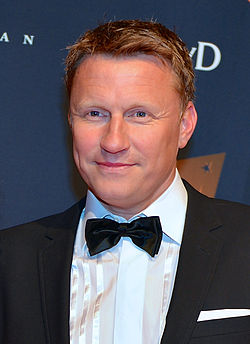 Andersson at the 2014 Svenska idrottsgalan | |||
| Personal information | |||
|---|---|---|---|
| Full name | Bernt Kennet Andersson | ||
| Date of birth | 6 October 1967 | ||
| Place of birth | Eskilstuna, Sweden | ||
| Height | 1.93 m (6 ft 4 in) | ||
| Position | Forward | ||
| Youth career | |||
| 1976–1981 | Tunafors SK | ||
| 1982–1984 | IFK Eskilstuna | ||
| Senior career* | |||
| Years | Team | Apps | (Gls) |
| 1985–1988 | IFK Eskilstuna | 76 | (20) |
| 1989–1991 | IFK Göteborg | 63 | (29) |
| 1991–1994 | Mechelen | 33 | (8) |
| 1993 | → IFK Norrköping (loan) | 13 | (8) |
| 1993–1994 | → Lille (loan) | 32 | (11) |
| 1994–1995 | Caen | 31 | (9) |
| 1995–1996 | Bari | 33 | (12) |
| 1996–1999 | Bologna | 86 | (26) |
| 1999 | Lazio | 2 | (0) |
| 1999–2000 | Bologna | 28 | (7) |
| 2000–2002 | Fenerbahçe | 73 | (19) |
| 2005 | Gårda BK | 18 | (14) |
| Total | 488 | (163) | |
| International career | |||
| 1983 | Sweden U16 | 4 | (1) |
| 1985–1986 | Sweden U18 | 11 | (1) |
| 1988–1990 | Sweden U21 | 14 | (2) |
| 1990–2000 | Sweden | 83 | (31) |
Medal record | |||
| * Club domestic league appearances and goals | |||
Bernt Kennet Andersson (born 6 October 1967) is a Swedish former professional footballer who played as a forward. Starting off his career with IFK Eskilstuna in the mid-1980s, he went on to play professionally in Sweden, Belgium, France, Italy, and Turkey before retiring in 2002. A full international between 1990 and 2000, he won 83 caps and scored 31 goals for Sweden national team and was a key member of the Sweden team that finished third at the 1994 FIFA World Cup. He also represented Sweden at UEFA Euro 1992 and 2000.